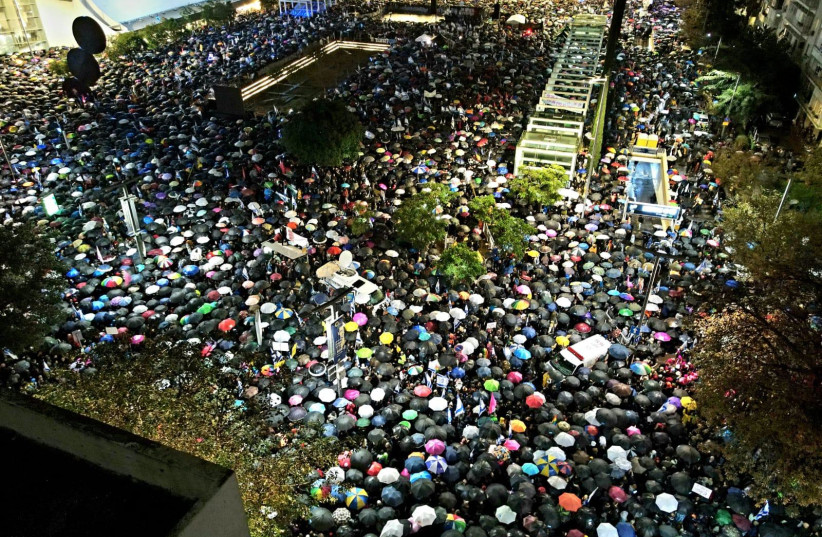Protesters against the government’s judicial reform will hold a “day of struggle” next Wednesday, which will include disruptions of public order, a coalition of protest leaders said on Thursday.
“This is the most important fight of my life,” former chief of staff and defense minister Moshe “Bogie” Ya’alon said at a press conference held by the protest leaders.
“We are in the midst of a legislative process that is a D9 [armored bulldozer] trampling over the judicial system, and it is clear according to every definition that this is a coup d’état. We are in the midst of an economic crisis and about to enter a security crisis, and all because of the coalition’s role to save [the prime minister] from the wrath of justice,” Ya’alon said.
The country is also heading toward a constitutional crisis where the High Court will rule that the judicial reforms are illegal, and then every governmental body will have to decide for itself whether to listen to the court or to the government, he charged. Even if the laws pass, it is important that the protests continue, so that these governmental bodies, including the police, IDF and others, understand who the majority is, he said.
Those who are protesting the judicial reforms are the majority of citizens who serve in the IDF, work and pay taxes, while “the 20% who support it are either the ultra-Orthodox who do not serve in the IDF or far-right ‘Smotriches’ and ‘Ben-Gvirs’ who support a halachic, theocratic, fascist and corrupt state,” Ya’alon said.

Tal Barnoach, general partner at Disruptive VC and part of the hi-tech protests movement, added that there would be “economic destruction and destruction of entrepreneurship and technology. The budget that is being put forward now will not be worth the paper it is written on. We could be put back 30 years, and this will most damage the weakest levels of society as there will be fewer taxes and the cost of living will be higher.”
Protests have been held for eight straight weeks on Saturday nights, with an estimated 250,000 people across the country participating in the most recent one, approximately 135,000 of whom attended the central protest at Kaplan Street in Tel Aviv.
The past two Mondays also included strikes, marches, roadblocks and even attempts to block the exits of coalition MKs’ homes to prevent them from reaching the legislature. On February 20, a protest was held as the Knesset plenum began debates on the first reading of the amendments to Basic Law: The Judiciary, which would give the coalition power to appoint all of the country’s judges, and block the High Court of Justice from hearing cases against Basic Laws.
A week earlier, on February 13, the first such protest was held outside of the Knesset as its Constitution, Law and Justice Committee approved the laws in their first reading, which essentially was the first vote in the Knesset on the reforms.
President Isaac Herzog
Both President Isaac Herzog and Chief of Staff Maj.-Gen. Herzi Halevi mentioned the tension surrounding the reform during a graduation ceremony at the IDF’s Officer Training School on Thursday.
“I know and hear from you that you are aware of the special place reserved for you – reserved for the IDF, for the entire IDF – as the glue that connects all parts of society; and at the same time also deliver an unequivocal message to our enemies: Even at a time of staggering disagreement, Israeli togetherness cannot be broken,” Herzog said.
“On a personal note: You are my inspiration during these days, as I do my best, day and night, as part of my job, to arrive at broad agreements to prevent a terrible rift between us and maintain our country as Jewish and democratic, in the spirit of the values of the Declaration of Independence that maintain the rule of law, human rights and minority rights,” the president said.
Halevi said that “currently, disagreement is rocking Israeli society. The IDF is a unique meeting point of the army and society, and therefore the disagreement also reaches its ranks: its soldiers, its citizens, its commanders, its sons.
“We, the commanders of the IDF in all ranks – and from today you, too, the male and female officers – [must] stand by the principle of the mission of the IDF, one national mission, and no other: protecting the state and maintaining the security of its citizens. Those who serve in the IDF are subject to the law and the army’s orders, and act according to the spirit of the IDF and its values,” the chief of staff.
“We will be attentive to the thoughts of soldiers regarding the dispute – not to take sides in it, but to leave it out and maintain one IDF, united around its complex tasks,” Halevi said.
“We will respect the special nature of our reserve force; we will remember and recall: two reservists can stand on either side of the dispute, and not involve it in their service. They will come to reserve duty, put on the uniform, leave the disagreements behind and set out on their missions shoulder to shoulder,” Halevi said in conclusion. “When they are not in active service, the reservists are citizens and have all the rights enjoyed by citizens in a democratic country. This separation is the only way to maintain a reserve army, which is very much needed.”
Not all reservists agreed with the chief of staff’s position, however. The “Brothers in Arms” reservists’ protest movement against the judicial reforms criticized Halevi for his speech. Just as they stood up to fight for the country, so too would they stand up and fight for democracy – and the chief of staff should be doing the same, the movement said.
